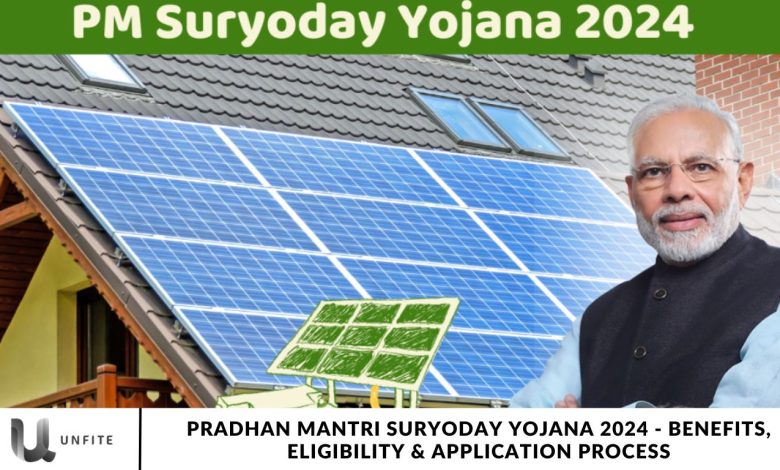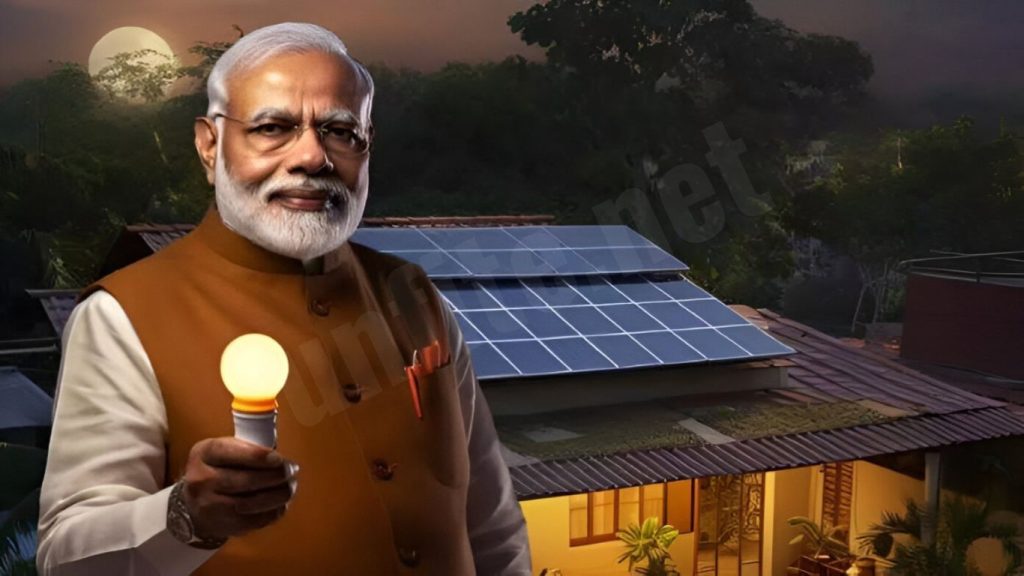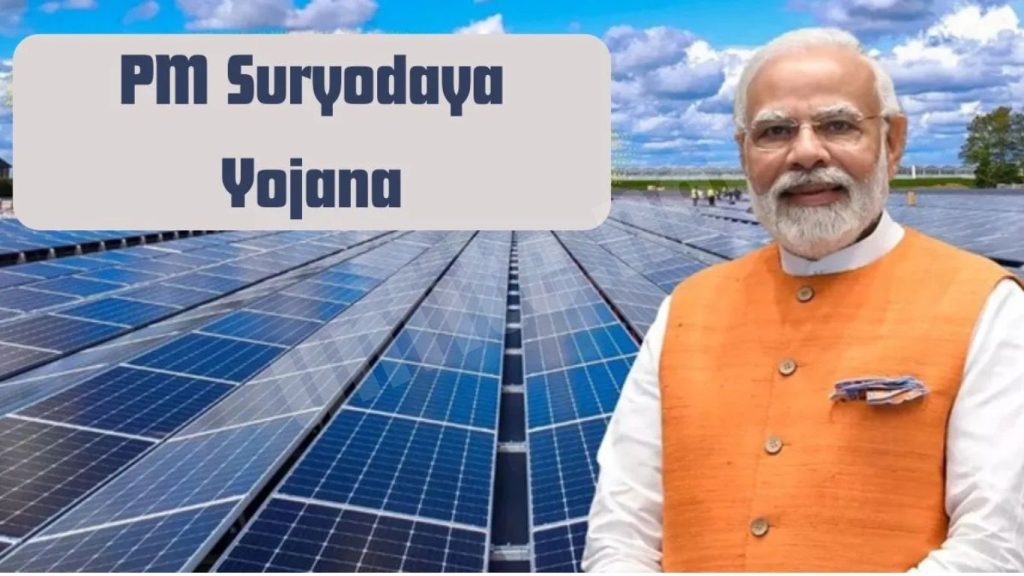Pradhan Mantri Suryoday Yojana 2024 – Benefits, Eligibility & Application Process

Prime Minister Narendra Modi has launched numerous schemes over the years, and now he has introduced another significant initiative – the Pradhan Mantri Suryoday Yojana 2024. Announced on January 22, 2024, following the life-prestige ceremony of the Ram temple, this scheme marks a historic move towards making India self-reliant in the energy sector.
We will explore the Pradhan Mantri Suryoday Yojana 2024 in detail, covering its key benefits, eligibility criteria, and the application process.
What is the Prime Minister Suryoday Scheme? (PM Suryoday Yojana 2024)
The Pradhan Mantri Suryoday Yojana aims to provide affordable and clean electricity by installing solar panels on the rooftops of over one crore lower and middle-income households across India. To ease the financial burden, the government will offer subsidies under this scheme, making it more accessible for beneficiaries.
Launched on January 22, 2024, the Pradhan Mantri Suryoday Yojana focuses on empowering these families to generate at least half of their electricity needs. This will help reduce electricity bills, improve their financial situation, and contribute to India’s goal of becoming energy self-reliant while also protecting the environment.
The objective of the PM Suryoday Yojana
The primary goal of the Pradhan Mantri Suryoday Yojana is to install solar power panels on the rooftops of one crore poor and lower-middle-income families across India.
This initiative will enable these households to generate at least half of their electricity independently, reducing electricity bills and improving their financial situation.
Additionally, the scheme will play a key role in making India energy self-sufficient while contributing to environmental conservation.
Benefits of PM Suryoday Yojana 2024

Reduction in Electricity Bills:
With rooftop solar panels, families will be able to generate a significant portion of their electricity, leading to a considerable decrease in their electricity bills. Households benefiting from the scheme can reduce their electricity costs by approximately 50% to 70%.
Economic Benefits:
By cutting down on electricity expenses, families will have more disposable income, which can be used for other necessities. This not only improves their quality of life but also strengthens their overall economic condition.
Employment Generation:
The scheme will require the construction and installation of a large number of solar panels, creating new employment opportunities across the country. The government estimates that millions of new jobs will be generated as a result.
Environmental Protection:
Reduced dependence on fossil fuels will decrease carbon emissions, helping protect the environment. Solar energy, being a clean and renewable resource, will lower pollution levels and contribute to a healthier ecosystem.
Energy Self-Sufficiency:
Increased solar energy production will reduce the country’s reliance on foreign energy imports, marking a significant step towards energy self-sufficiency. This will enhance both national security and economic stability.
What is Pradhan Mantri Suryoday Yojana 2024?
Overview of the Pradhan Mantri Suryoday Yojana 2024
The Pradhan Mantri Suryoday Yojana 2024 is a government initiative launched to promote solar energy adoption across India, particularly among lower and middle-income households. Under the scheme, solar panels will be installed on the rooftops of over one crore homes, enabling these families to generate a significant portion of their electricity independently. The scheme aims to reduce electricity bills for beneficiaries by 50% to 70%, offer government subsidies to ease the financial burden, and create new employment opportunities through the large-scale installation of solar panels. It represents a historic move toward energy self-sufficiency and environmental conservation.
Objectives of the Pradhan Mantri Suryoday Yojana
- Provide Affordable Clean Energy: The primary objective is to make solar energy affordable and accessible to economically weaker sections of society.
- Reduce Electricity Bills: The scheme allows households to generate their own power, reducing monthly electricity expenses and improving the financial stability of beneficiary families.
- Promote Energy Self-Sufficiency: The scheme is designed to reduce India’s dependency on fossil fuels and foreign energy imports, strengthening the country’s energy independence.
- Boost Employment Opportunities: The construction and installation of solar panels will generate millions of jobs, contributing to India’s economic growth.
- Environmental Sustainability: The scheme promotes solar energy, aiming to lower carbon emissions, reduce pollution, and contribute to a cleaner, healthier environment.
Importance of Solar Energy in India’s Future Energy Strategy
Solar energy plays a critical role in India’s energy strategy. The nation is shifting toward renewable resources to meet growing energy demands while reducing carbon footprints. With abundant sunlight available throughout the year, India has immense potential to harness solar power.
- Reducing Fossil Fuel Dependency: India is heavily reliant on coal and other fossil fuels for electricity generation. Solar energy provides a clean and renewable alternative.
- Environmental Benefits: Solar power generation reduces greenhouse gas emissions, helping India meet its commitments under international climate agreements.
- Sustainable Development: Integrating solar energy helps achieve long-term sustainability by reducing reliance on non-renewable resources.
- Energy Access in Rural Areas: Solar energy can be a reliable solution for providing electricity to remote and underserved areas, enhancing the quality of life in rural India.
- Cost-Effective Solution: Solar energy can lower energy costs for households and businesses, fostering economic growth and energy security.
Critical Benefits of Pradhan Mantri Suryoday Yojana
Reduction in Electricity Bills
The Pradhan Mantri Suryoday Yojana 2024 is set to significantly lower electricity costs for households by enabling them to generate a substantial portion of their energy needs through solar power. By installing solar panels on the rooftops, families can produce up to 50% to 70% of their electricity, resulting in a dramatic reduction in their monthly bills. For many low- and middle-income households, this means substantial savings that can lead to increased disposable income. By alleviating the financial burden of high electricity costs, families can allocate their resources to other essential needs, enhancing their overall quality of life.
Economic Benefits for Families
The economic impact of the Pradhan Mantri Suryoday Yojana extends beyond just reducing electricity bills. By decreasing these costs, families can free up a significant portion of their income, allowing them to invest in other necessities such as education, healthcare, and savings. This shift not only improves individual financial situations but also stimulates local economies. As more households benefit from this scheme, the collective increase in spending can lead to more significant economic growth, ultimately enhancing the standard of living for countless families. Furthermore, the financial relief provided by reduced electricity expenses contributes to poverty alleviation in vulnerable communities.
Environmental Impact
One of the Pradhan Mantri Suryoday Yojana’s most critical advantages is its contribution to environmental sustainability. By harnessing solar energy, the scheme promotes a cleaner, renewable energy source that significantly reduces carbon emissions associated with fossil fuel consumption. Solar energy is emission-free, helping to combat air pollution and climate change. As more households transition to solar power, the cumulative effect can lead to a significant reduction in greenhouse gas emissions, thus contributing to India’s commitment to international climate agreements and enhancing the country’s overall environmental health.
Job Creation
The implementation of the Pradhan Mantri Suryoday Yojana is expected to create numerous employment opportunities across various sectors. The construction and installation of solar panels will require skilled and unskilled labor, providing jobs in manufacturing, installation, and maintenance. The government estimates that this initiative could generate millions of new jobs, contributing to the growth of the renewable energy sector in India. This job creation not only supports economic development but also fosters skills development and training for the workforce, preparing them for future opportunities in the expanding green economy.
Energy Self-Sufficiency
By increasing the production of solar energy, the Pradhan Mantri Suryoday Yojana plays a vital role in reducing India’s dependence on imported energy sources. As the country aims for energy self-sufficiency, the promotion of renewable energy sources like solar power becomes crucial. By fostering domestic energy production, India can stabilize its energy supply, lower vulnerability to global energy market fluctuations, and enhance national security. This shift towards renewable energy is a significant step toward achieving a sustainable energy future, ensuring that India meets its energy needs while protecting the environment and bolstering its economy.
Eligibility Criteria for Pradhan Mantri Suryoday Yojana
Criteria for Beneficiaries
The Pradhan Mantri Suryoday Yojana 2024 has specific eligibility criteria to ensure that the scheme effectively targets those in need, notably lower and middle-income households. The primary criteria include:
Income Groups:
- Beneficiaries must belong to lower and middle-income groups, typically defined as households earning below a certain threshold, which the government usually sets.
- The specific income limit may vary by region and will be outlined in government notifications to ensure that the most economically vulnerable families are prioritized.
Household Types:
- The scheme is primarily aimed at residential households. Eligible households may include:
- Families living in permanent or semi-permanent structures.
- Households that own or rent their residences.
- Households with existing government electricity connections are generally given preference.
Eligibility for Subsidies
To qualify for the subsidies under the Pradhan Mantri Suryoday Yojana, applicants must meet the following criteria:
- Proof of Income: Applicants will need to provide documentation demonstrating their income level, such as pay slips, income tax returns, or government-issued income certificates.
- Proof of Residency: Valid proof of residency, such as utility bills or government ID showing the address, will be required.
- Existing Electricity Connection: Households must have an existing electricity connection to be eligible for solar panel installation.
- Application Process: Eligible families must apply through designated government portals or local authorities to access the subsidies. The application will typically require the submission of necessary documentation and compliance with the scheme’s guidelines.
Special Provisions for Rural and Urban Areas
The Pradhan Mantri Suryoday Yojana recognizes the unique needs of both rural and urban areas and incorporates special provisions for each:
Rural Areas:
- The scheme places a strong emphasis on benefiting rural households, where electricity access may be limited or unreliable.
- Additional incentives may be provided for households in remote areas to encourage the installation of solar panels, thereby improving energy access and promoting rural electrification.
- Training programs may be implemented to educate rural communities about solar technology and maintenance, fostering local entrepreneurship.
Urban Areas:
- The scheme will focus on multi-story residential buildings and housing complexes, facilitating the installation of solar panels on rooftops.
- Urban beneficiaries may have access to streamlined application processes and quick installation timelines to encourage rapid adoption of solar energy.
- Partnerships with local municipal bodies and housing associations may be established to promote awareness and participation in the scheme.
How Pradhan Mantri Suryoday Yojana Will Help India

Long-Term Impact on India’s Energy Independence
The Pradhan Mantri Suryoday Yojana 2024 is poised to transform India’s energy independence over the long term. By promoting the installation of solar panels across one crore lower—and middle-income households, the scheme encourages a shift from reliance on imported fossil fuels to domestic renewable energy sources.
Key aspects of this long-term impact include:
- Reduction of Energy Imports: By increasing the domestic generation of solar power, India can significantly decrease its reliance on imported oil and gas, thereby enhancing its energy security and reducing vulnerability to global market fluctuations.
- Diversification of Energy Sources: The scheme supports the diversification of India’s energy portfolio. By investing in solar energy, the country can reduce its dependence on coal and other non-renewable resources, leading to a more balanced and resilient energy grid.
- Stimulation of Renewable Energy Sector: The initiative fosters growth in the renewable energy sector, attracting investment and innovation, which can lead to advancements in solar technology and related infrastructure, further solidifying India’s energy independence.
Contribution to Environmental Sustainability
The Pradhan Mantri Suryoday Yojana also plays a crucial role in advancing environmental sustainability in India. By promoting the use of solar energy, the scheme helps to mitigate several critical ecological issues:
- Reduction of Carbon Emissions: Solar power is a clean and renewable energy source that produces no greenhouse gas emissions during operation. By replacing fossil fuel energy with solar energy, India can significantly reduce its carbon footprint, contributing to global climate change mitigation efforts.
- Improved Air Quality: Transitioning to solar energy reduces air pollution caused by burning fossil fuels, leading to healthier living conditions and improved public health outcomes. This is especially important for urban areas, which often face high levels of air pollution.
- Promotion of Sustainable Practices: The scheme encourages the adoption of renewable energy technologies, fostering a culture of sustainability and environmental responsibility among households. By empowering individuals to harness solar energy, it promotes awareness and commitment to eco-friendly practices.
Strengthening of the Rural Economy through Solar Initiatives
The Pradhan Mantri Suryoday Yojana 2024 is also expected to strengthen the rural economy in multiple ways:
- Enhanced Energy Access: The scheme improves energy access in areas where traditional electricity infrastructure is lacking or unreliable by providing solar power to rural households. This reliable energy source can facilitate better agricultural practices, enhance productivity, and support small businesses.
- Job Creation: The installation of solar panels creates job opportunities in rural areas, including positions in manufacturing, installation, maintenance, and system management. This job creation not only alleviates unemployment but also helps build a skilled workforce in the renewable energy sector.
- Economic Diversification: Solar energy allows rural households to engage in additional income-generating activities, such as agribusiness, handicrafts, and small-scale industries that rely on consistent electricity. This diversification can lead to improved livelihoods and economic stability in rural communities.
- Community Development: As households gain access to affordable and reliable electricity, it can lead to better educational opportunities, healthcare services, and improved living standards. The overall upliftment of rural communities can result in a more balanced and inclusive economic growth trajectory for the nation.
What is the PM Suryodaya Yojana?
The Pradhan Mantri Suryoday Yojana is a central government initiative designed to provide affordable electricity to low—and middle-income households through the installation of solar rooftop systems. This program not only aims to reduce electricity bills but also enables households to earn additional income by selling surplus electricity back to the grid.
Prime Minister Narendra Modi emphasized that every household with a roof can harness solar energy, empowering them to become genuinely Aatmanirbhar (self-reliant) and meet their electricity needs. He has called for a comprehensive national campaign to encourage the widespread adoption of rooftop solar systems among residential consumers.
These solar rooftop panels are photovoltaic systems that connect directly to the main power supply, significantly lowering grid electricity consumption and helping consumers save on energy costs. The scheme mainly focuses on inclusivity, extending benefits to citizens living below the poverty line (BPL) with minimal initial investment required, thereby promoting self-sufficiency in India’s energy sector.
Frequently Asked Question
What is the Pradhan Mantri Suryoday Yojana 2024?
The Pradhan Mantri Suryoday Yojana 2024 is a government initiative to provide affordable electricity to low—and middle-income households through the installation of solar rooftop panels. The scheme encourages energy self-sufficiency and offers opportunities for generating additional income from surplus electricity.
Who is eligible to apply for this scheme?
Eligibility primarily includes low- and middle-income households, especially those living below the poverty line (BPL). Applicants must have a valid electricity connection and reside in permanent or semi-permanent housing.
What are the key benefits of the Pradhan Mantri Suryoday Yojana?
Key benefits include significant reductions in electricity bills (up to 70%), the potential to earn from surplus electricity sold back to the grid, and a positive environmental impact by reducing carbon emissions. The scheme also supports job creation in the solar energy sector.
How can I apply for the Pradhan Mantri Suryoday Yojana?
Interested individuals can apply through designated government portals or local authorities. The application process typically involves submitting required documentation, such as proof of income, residency, and an existing electricity connection.
Is there any subsidy available under this scheme?
Yes, the government offers subsidies to eligible beneficiaries to reduce the financial burden associated with the installation of solar rooftop systems. The exact subsidy amount will depend on the household’s income level and the size of the solar installation.
How much can beneficiaries save on their electricity bills?
Beneficiaries can expect to save between 50% and 70% on their electricity bills by generating their solar energy, thus significantly reducing reliance on grid electricity.
Are there any special provisions for rural areas?
Yes, the Pradhan Mantri Suryoday Yojana includes specific provisions to benefit rural households, such as additional incentives for installations in remote areas and training programs to educate communities about solar technology.
What impact will this scheme have on the environment?
The scheme promotes the use of clean, renewable solar energy, reducing carbon emissions and air pollution. This shift away from fossil fuels supports India’s commitment to environmental sustainability and climate change mitigation.
How does this scheme contribute to energy independence in India?
By encouraging the adoption of solar energy at the household level, the Pradhan Mantri Suryoday Yojana aims to decrease India’s reliance on imported fossil fuels, thereby enhancing the country’s energy security and promoting a more self-sufficient energy landscape.
Conclusion
The Pradhan Mantri Suryoday Yojana 2024 represents a significant stride towards energy self-sufficiency and environmental sustainability in India. By facilitating the installation of solar rooftop panels for low- and middle-income households, the scheme not only aims to reduce electricity costs but also empowers families to generate additional income through surplus energy production.
With its inclusive eligibility criteria and government subsidies, the initiative opens up opportunities for millions of households, especially those below the poverty line, to embrace renewable energy solutions. The scheme is poised to have a positive impact on the environment by reducing carbon emissions and promoting cleaner air, contributing to India’s commitment to combat climate change.




